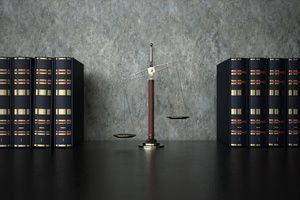Individuals flourish best when they are free to exercise certain rights. However, determining what these rights are and what rules protect them is the first step to ensuring that people receive the freedoms that they deserve. The rule of law is critical in this process; here’s how it protects your individual rights.
What Is the Rule of Law?

The rule of law is a set of principles that secure and guarantee order and peace in a society. The foundational elements-which can involve laws, institutions, norms and more-serve to maintain accountability, justice, transparency, human dignity and economic opportunities.
The principle of the rule of law states that every individual, entity and institution must respond to laws that are “publicly promulgated, equally enforced, independently adjudicated and consistent with international human rights principles.”
To fully understand how the rule of law ensures an ordered and peaceful society, authorities must ensure that the rights of everyone-not just the majority-are intact and not infringed.
What Is the Difference Between an Individual Right and a Civil Right?
First, it is important to differentiate individual rights from human rights. Though the two are close in definition and nature, there are minute differences that set them apart.

Human rights are universal rights that every human being has. On the other hand, individual rights focus more on the opportunities that every individual has; they have the right to pursue what they desire without intervention from either the government, entities or individuals. Many of the most well-known individual rights are found in the Bill of Rights.
Civil rights, on the other hand, vary with the nation. Such rights can be described as some human and individual rights that are put into law and legislation, usually born from concepts of equality and justice.
How Does the Rule of Law Protect Individual Rights?
As mentioned before, the rule of law protects individual rights by enforcing peace and order in society through a set of principles.
Since individual rights by nature involve equality, the rule of law supports this by ensuring that government and individual intervention do not hinder the individual’s pursuit of what they wish-so long as it does not infringe on civil rights.
The rule of law protects individual rights through “equally enforced [laws], public promulgation, independent adjudication, and consistency with international human rights principles.”

- Equally enforced laws ensure that the individual rights of minorities will not be deemed as inferior. No matter the race, class and economic or social status of the individual, their individual rights are still protected by equally applied laws for the population.
- The fact that laws are implemented publicly creates an opportunity for individuals to exercise their rights and hold the system accountable if ever there were cases of injustice or morally complex contexts with certain laws.
- Having laws independently adjudicated guarantees that the laws passed will be just and fair, which aligns with the vision of the law of rights (protecting the peace and order in society) and the purpose of individual rights (creating equal opportunities for individuals to live their desired lives).
- Laws that are consistent with international human rights principles would naturally protect individual rights, as the essence of human rights and individual rights are the same.
Although the majority of the Bill of Rights protects individual rights, one can also see some examples in which the original text from the Constitution also protects individual rights:
- Article I, Sections 9 and 10 from the Constitution forbid ex post facto laws and bills of attainder, which helps to prevent government intervention in individual rights.
- Article III, Section 2 supports the right to trial by jury in all cases in the state where the crime was carried out. This demonstrates the equally enforced laws, hence showing that the laws do not discriminate based on any groups’ individual rights.
Trust the Legal Professionals to Help You Protect Your Rights
Discrimination, false arrests and defamation are just a few of the many examples in which your rights could potentially be violated. If you feel as if your individual or civil rights have been violated, you may have legal recourse not only to seek justice, but to secure compensation as well.
At The Brown Firm, our attorneys would be happy to help you understand your rights and whether they have been violated. From there, we can assist you with filing a lawsuit and attempting to secure damages. Reach out to learn more or to schedule a consultation to get started.

